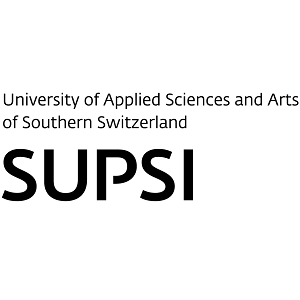Ph.D. students in AI-based Neuromorphic NanoRobotics
Position Details (PhD Research Project)
Deadline: 30.09.2025
The University of Applied Sciences and Arts of Southern Switzerland (SUPSI) invites applications for a Ph.D. student in AI-based Neuromorphic NanoRobotics,within the Department of Innovative Technologies (DTI), located in Lugano. The degree of employment is 100%, with a contract starting on Dice November 1st, 2025, or on a mutually agreed date. The candidates will be enrolled in the Ph.D. program of the Institute of Neuroinformatics of UZH-ETH Zürich.
Duties and responsibilities
Research activity in the field of artificial intelligence, i.e., spiking and artificial neural networks, embedded ultra-low-power neuromorphic systems, and nano-robotic platforms. The two Ph.D. positions are framed within an engaging and exciting international research project funded by the Swiss National Science Foundation (SNSF) on cutting-edge technologies for the next generation of intelligent, autonomous, and neuromorphic-based nano-robots (i.e., sub-ten centimeters diameter, tens of grams in weight).
Development of frame-based and event-based deep learning models for visual inertial odometry.
Embedded programming on ultra-low-power ARM-/RISC-V-based microcontroller units.
Study of the state-of-the-art in the field of geometry-based and deep learning-based visual inertial odometry.
Implementation of algorithmic optimization for resource-constrained — memory and computation — embedded platforms.
Writing scientific papers (i.e., both conference and journal articles) and internal reports.
Presenting your own work to a wide audience (e.g., conferences, project partners review meetings).
Teaching assistance in core classes both at SUPSI and UZH-ETH Zürich.
Requirements
Essential
- Master’s in Electrical Engineering, Electronics or Computer Science Engineering, Informatics, or other quantitative fields.
- Candidate 1: strong background in the electronic embedded domain (engineering) with a solid initial knowledge in machine/deep learning. The candidate should be highly motivated in extending her/his expertise and practical experience in both domains, in particular in the latter.
- Candidate 2: strong background in the machine/deep learning domain and some preliminary experience/interest in the electronic embedded (engineering) one. The candidate should have a strong desire for personal growth – theoretical and practical – in both domains, particularly in the embedded one.
- High motivation and commitment with a strong desire for research and publishing at top conferences and journals.
- Excellent theoretical background in computer architectures and embedded processing (e.g., low-power and ultra-low-power digital signal processing).
- Excellent theoretical background in tiny machine learning (TinyML), deep learning, and computer vision for robotics.
- Experience with C programming for embedded devices and microcontrollers (e.g., STM32, ESP32, GAP8/9).
- Experience with Python programming and familiarity with development frameworks such as PyTorch, Tensorflow, Tensorflow Lite.
- Solid knowledge of visual inertial odometry tasks for robotic state estimation, both geometric-based and deep learning-based approaches.
- Familiarity with neuromorphic-based perception and processing, such as event-based cameras and spiking neural networks.
- Proficiency in written and spoken English.
- Good organizational skills, ability to work independently and to plan and direct own work.
- Ability to work in a team and with colleagues and other members of the Institute, engage in scientific dialogue.
- Strong motivation and commitment to fulfill research activities, milestones, and deadlines.
- Interest in teaching and tutoring students is also required.
Preferred
- Experience in low-level C/assembly optimizations.
- Experience with digital signal analysis and lab equipment (oscilloscopes, power analyzer).
- Familiarity with parallel programming (e.g., CUDA) of many-core, multi-core, and heterogeneous systems (e.g., NVIDIA Tegra board, ARM big.LITTLE).
- Familiarity with robotics platforms, such as the Bitcraze Crazyflie nano-sized quadrotor.
- Familiarity with sensors’ drivers (e.g., IMU) and their communication protocols (e.g., I2C, SPI).
- Trackable hands-on experience on practical projects (e.g., competitions, hackatons, challenges).
What SUPSI Offers
- Fixed-term contract, with possibility of renewal.
- Enrollment at the Ph.D. program of the Institute of Neuroinformatics of UZH-ETH Zürich – Doctorate title issued by both UZH and ETH Zürich.
- Workplace at IDSIA USI-SUPSI in the new campus in Lugano (Switzerland).
- An international working environment.
- Attractive salary in line with Swiss standards and the experience of the candidate.
- Covering the costs of participation in high-profile conferences, workshops and schools.
Application Process
Applications will only be considered if submitted electronically by 30.09.2025, through the dedicated application form. The following documents, written in English, must be included:
- Curriculum vitae and publications list and Master thesis (draft for graduation in December 2024).
- Name and e-mail address of two reference contacts.
- A motivation letter, including a brief description of past research experience and future interests (1-2 pages).
For further information, please contact
Dr. Daniele Palossi ([email protected])
Prof. Dr. Melika Payvand ([email protected])
Incomplete applications, those submitted to incorrect addresses, or those received after the deadline will not be considered. In addition to the required application documents, further documentation (such as a criminal record certificate or a copy of an identity document) may be requested at a later stage.



 University of Applied Sciences & Arts of Southern Switzerland (SUPSI)
University of Applied Sciences & Arts of Southern Switzerland (SUPSI)